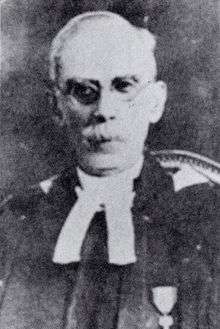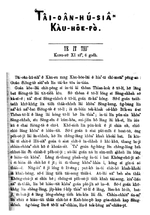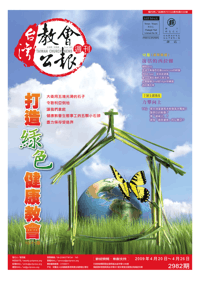Taiwan Church News
|
Front cover from April 2009 | |
| Frequency | Weekly |
|---|---|
| Publisher | Taiwan Church Press |
| First issue | 1885 |
| Country | Taiwan |
| Based in | Tainan |
| Language | Mandarin Chinese, some sections in Taiwanese |
| Website | http://weekly.pctpress.org |
The Taiwan Church News (Chinese: 台灣教會公報; pinyin: Táiwān Jiàohuì Gōngbào; Pe̍h-ōe-jī: Tâi-oân Kàu-hoē Kong-pò) is a publication of the Presbyterian Church in Taiwan. It was first published in 1885 as the Tâi-oân-hú-siâⁿ Kàu-hōe-pò (臺灣府城教會報; Táiwān Fǔchéng Jiàohuì Bào; "Taiwan Prefecture City Church News") under the direction of missionary Thomas Barclay, and was Taiwan's first printed newspaper. This early edition was also notable for being printed in romanised Taiwanese using the Pe̍h-ōe-jī orthography. The publication was banned during the latter stages of Japanese rule and editions were also impounded on several occasions during the martial law era in post-war Taiwan for discussing forbidden subjects.
Early years


In Taiwan in the late 1800s (during Taiwan's Qing era), only the educated elite could read and write.[1] Christian missionaries in southern Taiwan were anxious that their congregations should learn to read and write, and were convinced that romanised script (i.e. Pe̍h-ōe-jī) was easier to learn than Chinese characters.[2] James Laidlaw Maxwell, a medical missionary, donated a small printing press to the church in 1880,[3] but at the time nobody in Taiwan-fu (modern-day Tainan)[4] knew how to operate it.
In 1881 while on furlough in Glasgow, Thomas Barclay studied printing techniques, and on his return to Taiwan-fu he sent others for printing training and set up a machine shop, which started printing in 1884.[3][5] Then in June 1885 came the first issue of the Tâi-oân-hú-siâⁿ Kàu-hōe-pò (Taiwan-fu Church News), which thus became the first printed newspaper in the island.[6]
The newspaper was just one of the products of the new press, and William Campbell was later able to proudly write that "our Tainan Mission Press turned out 700,357 pages, chiefly in the dialect or brogue of South Formosa during 1913".[7] In 1915 the newspaper was reported as having a circulation of roughly 1,600.[8]
List of name changes
| Han characters | POJ | Time |
|---|---|---|
| 臺灣府城教會報 | Tâi-oân-hú-siâⁿ Kàu-hōe-pò | 12 July 1885—December 1891 |
| 臺南府教會報 | Tâi-lâm-hú Kàu-hoē-pò | 1892[9] |
| 臺南府城教會報 | Tâi-lâm Hú-siâⁿ Kàu-hoē-pò | January 1893—December 1905 |
| 臺南教會報 | Tâi-lâm Kàu-hoē-pò | 1906—July 1913 |
| 臺灣教會報 | Tâi-oân Kàu-hoē-pò | July 1913—April 1932 |
| 臺灣教會公報 | Tâi-oân Kàu-hoē Kong-pò | May 1932—March 1942 |
| 臺灣教會公報 | Tâi-oân Kàu-hoē Kong-pò | December 1945—March 1969 |
| 臺灣教會公報 | Tâi-oân Kàu-hoē Kong-pò | December 1969—present |
World War II to the present
In 1942 after Japan and the United States declared war on each other, the missionaries were expelled from Taiwan, which was at the time a Japanese colony, and the press was closed.[3] After the defeat of Japan and the takeover by the Kuomintang, the Taiwan Church News resumed publication. However, in 1969 the printing of the Taiwan Church News in Pe̍h-ōe-jī was banned by the Kuomintang government of the time, who were taking action to restrict the use of local languages.[10]
From that point on, the publication appeared in Mandarin Chinese characters, and even after the restrictions were lifted in the 1980s, Mandarin continued to be the dominant language, with "native languages" (Taiwanese Hokkien, Hakka and Formosan languages) confined to a "Mother Tongue Section" from 1991 onwards.[10] On several occasions the magazine was confiscated by the authorities for running articles on forbidden topics, such as a discussion of the February 28 Incident which saw the entire print run of 6,700 copies seized in 1987.[11]
The modern incarnation of the periodical takes the form of a weekly magazine, plus ad hoc English reports on the organization's website.
Notes
- ↑ Davidson (1903), pp. 601-2.
- ↑ Lin (1999).
- 1 2 3 "Our Story". Taiwan Church News. Archived from the original on March 1, 2009. Retrieved 2009-04-30.
- ↑ Modern-day Tainan was formerly the capital of the island, which was governed as Taiwan Prefecture of Fujian Province. Hence its former name of Taiwan-fu (Chinese: 臺灣府城; pinyin: Táiwān fǔchéng; Pe̍h-ōe-jī: Tâi-oân-hú-siâⁿ; literally: "Taiwan Prefecture City")
- ↑ Davidson (1903), pp. 607-8: "An important factor in the diffusion of education among the natives interested in the mission, is the mission newspaper, entitled "The Tainanfu Church News." It has been in existence for fully sixteen years, and has a monthly circulation of about 800 copies. It is printed in Romanized Chinese, and is, therefore, read, almost exclusively, by Christians familiar with that system. This is the first newspaper published in the island, and owes its existence to Rev. Barclay, who, while on furlough in Scotland, some seventeen years ago, obtained instruction in type setting. He brought out with him a printing press, type, etc., and taught a few intelligent Chinese the printing trade. These, in turn, have taught others, so that at present there is an efficient force of Chinese printers. One of the European missionaries occupies the chair of editor in chief, Rev. Barclay at present holding that position. In addition to the newspaper, a great deal of Christian literature, chiefly in the Romanized Chinese, is issued. There are at present among the Christians more than 2,000 who can read fluently in Romanized Chinese."
- ↑ Copper (2007), p. 240.
- ↑ Campbell (1915), p. 362.
- ↑ Oldham (1915), p. 624.
- ↑ With the creation of Tainan Prefecture in 1887, the city name was changed from Taiwan-fu to Tainanfu. It remained a prefecture seat but was no longer the capital of the island.
- 1 2 Klöter 2005, p. 217
- ↑ "Presbyterians protest confiscation" (PDF). Taiwan Communiqué. International Committee for Human Rights in Taiwan. 30: 24. May 1987. ISSN 1027-3999.
References
- Campbell, William (1915). Sketches from Formosa. London: Marshall Brothers. OL 7051071M.
- Copper, John F. (2007). Historical dictionary of Taiwan (Republic of China). Scarecrow Press. ISBN 9780810856004. OL 7997166M.
- Davidson, James W. (1903). The Island of Formosa, Past and Present : history, people, resources, and commercial prospects : tea, camphor, sugar, gold, coal, sulphur, economical plants, and other productions. London and New York: Macmillan. OL 6931635M.
- Klöter, Henning (2005). Written Taiwanese. Wiesbaden: Harrassowitz. ISBN 9783447050937.
- Lin, Christine L. (1999). "The Presbyterian Church in Taiwan and the Advocacy of Local Autonomy". Sino-Platonic Papers (92). Philadelphia, PA: Dept. of Asian and Middle Eastern Studies, University of Pennsylvania. OCLC 41882313.
- Oldham, Joseph Houldsworth (1915). International Review of Missions. 4. Edinburgh.
